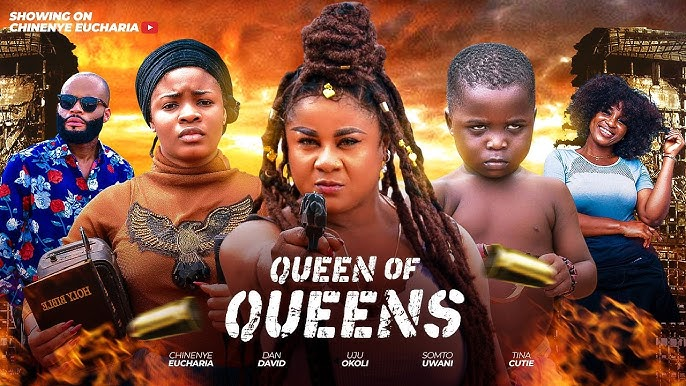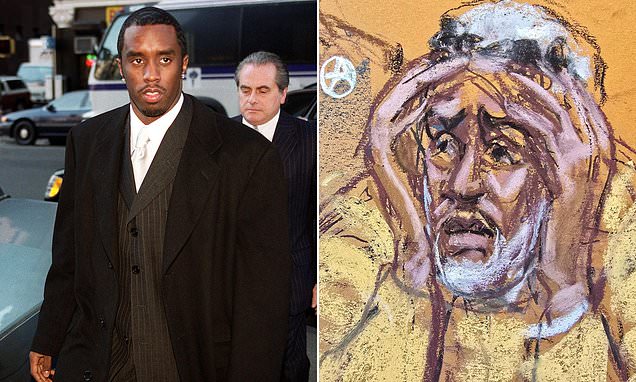The film “Queen of Queens” is not merely a movie; it is an explosive social indictment masquerading as a melodrama. Released in 2025, this Nollywood production, starring Chinenye Eucharia, tears apart the traditional narrative veil of morality and faith to expose the rot that can sometimes flourish beneath sanctified ground. It is a grueling, necessary watch that demands uncomfortable questions about institutional protection, predatory power, and the devastating cost of survival.
From the first frame, we are pulled into the impossible life of Grace, a young woman whose talent for evangelism is matched only by her desperation to survive. She is a powerhouse on the street corner, winning souls for Christ with fiery conviction, yet she simultaneously operates as an escort to pay off a debilitating debt to the merciless “Queen of Queens.” The film uses Grace’s impossible situation as narrative scaffolding to explore a devastating cycle of trauma and betrayal that transcends mere dramatic flair, culminating in one of the most shocking and visceral reveals in recent African cinema. This review delves into the complex layers of hypocrisy, trauma, and ultimately, the quest for justice within the confines of this relentless story.
Thematic Dichotomy: The Evangelist and the Hustler
The core strength of Queen of Queens lies in its unflinching portrayal of Grace’s thematic dichotomy. This is not a subtle struggle; it is a full-scale emotional war fought across a 24-hour clock. By day, Grace is Sister Grace, radiating the light of conviction. By night, she is merely a transaction, navigating the brutal calculus of her trade to scrape together funds for the Queen of Queens.
Chinenye Eucharia’s performance as Grace is utterly compelling, oscillating violently between these two poles. As the evangelist, her voice is firm, her demeanor commanding, and her sermons are packed with a visible, fervent zeal—a performance so convincing it brings testimonials and offerings. However, as the hustler, her energy drains away; her eyes are hollow, her movements mechanical, and her voice quiet, betraying the crushing weight of her debt.
The film immediately establishes that Grace’s dual life is not a matter of moral failing, but of financial and physical duress. This is powerfully articulated early on in the scene where her friend, Tina, confronts her after witnessing her nightly activities. Tina attempts to appeal to Grace’s faith, calling her a hypocrite. Grace’s explosive, heart-wrenching response serves as the thesis statement for the entire film:
“Where was God when my mother died? Where was God when my mother died in poverty? My uncle raped me and used me… Where was God when I was suffering?”
This raw outburst reframes Grace’s “hypocrisy” not as a flaw, but as a devastating coping mechanism. If God, the church, and the family failed her in her most vulnerable moment, then the only viable path is the one that guarantees survival and autonomy, however painful. The offerings she collects during the day are not for the ministry; they are the desperate means of paying down a modern-day slavery debt, ironically using the very system that failed her as a source of desperate, coerced income.
The film thus presents a profound critique of institutional Christianity. It contrasts the outward appearance of unwavering faith and moral purity—represented by the Pastor and the church structure—with the devastating realities faced by those who have been chewed up and spat out by societal cruelty. The fire of Grace’s preaching becomes less about salvation and more about performance, an act designed to harvest resources necessary for her continued existence.
Character Analysis: The True Face of Evil
Queen of Queens expertly deploys a dual antagonist structure, setting up a terrifying external threat that distracts the audience from the far more insidious internal predator.
The External Menace: Queen of Queens
The character of the Queen of Queens and her henchmen (like Smith) embodies overt, immediate evil. She is loud, unapologetically vulgar, and motivated purely by profit, treating human beings as collateral and debt machines. Her introduction is jarring, demonstrating her power not through whispers, but through violent, public humiliation. In one particularly tense scene, she confronts Grace (who is still in her evangelist gear) and demands payment:
“I don’t get that luxury of time. One week I give you… If not, you no say your name Grace, you hear me?”
The Queen of Queens operates outside the law and conventional morality, creating a high-stakes action subplot. She is the monster Grace is running from, and the immediate motivation for her double life. She represents the tangible, physical danger of the streets—a necessary, visible evil to provide the narrative tension that keeps the plot moving. Her eventual arrest, facilitated by Daniel, feels like a partial, albeit satisfying, victory for order.
The Institutional Monster: Pastor Ben (Uncle Ichie)
The film’s genius, however, lies in revealing the monster Grace was running to. The character of Pastor Ben (Daniel’s father and the head of the church where Grace preaches) is initially presented as a benevolent, if somewhat naïve, figure of authority.
The revelation in the third act is a masterful and devastating twist. During a private meeting with the Pastor and Daniel, Grace, after Tina has fled and the external threat has been removed, reveals the trauma of her childhood. She confesses that the person who sexually abused her when she was 10, the “uncle” who ruined her life and drove her to the streets, was none other than the Pastor himself, identified by an old photograph Daniel had shown her.
This reveal transforms the entire film. The conflict shifts instantly from Grace vs. the streets to Grace vs. the institution of faith. Pastor Ben is not just a predator; he is the ultimate hypocrite, hiding behind the pulpit, using his spiritual authority to command the very victim he created. His earlier praise of Grace’s ministry—calling her a “daughter of Zion”—suddenly sounds grotesquely manipulative. He didn’t just forgive her sins; he benefited from her misery, absorbing the money she earned to pay off the debt that resulted from the life he set her on. The scene where the Pastor physically collapses, mumbling in disbelief, “I remember myself… oh shit I remember,” is a harrowing depiction of a man’s moral foundation crumbling in an instant of forced accountability.
This structural choice by the filmmakers is deliberate: the Queen of Queens takes Grace’s body, but Pastor Ben took her soul, her innocence, and her very ability to trust the foundations of society.
Narrative Mechanics: Suspense and the Quest for Truth
The film’s pacing is relentless, sustained by Daniel’s gradual, unnerving discovery. Daniel serves as the audience’s surrogate, the well-meaning, slightly sheltered son who returns home and encounters the shocking truth right under his father’s nose.
His confusion begins with a “terrible dream” about Grace, evolving into tangible evidence. The moment he leaves the church late at night and witnesses Grace engaging in her nightly hustle—the second crucial piece of evidence—is a gut-punch. His whispered reaction, “God have mercy… a Christian during the day and a hustler at night,” perfectly captures the audience’s initial shock and disbelief. Daniel’s investigation is not framed as judgment, but as a desperate attempt to reconcile two impossible realities, driving the suspense forward.
The narrative structure pays off beautifully in the final, dramatic meeting. The filmmakers wisely choose to have Grace deliver her confession to a small, private audience rather than a large church, preserving the dramatic intensity. Her testimony—detailing the abuse, the escape to Ghana, the sale to the Queen of Queens, and the desperate use of the church offerings—is delivered with a stoic, broken dignity that holds the room, and the audience, captive.
The resolution is complex and morally ambiguous. The Queen of Queens is arrested, which brings external closure. However, the emotional and institutional fallout is contained. Pastor Ben collapses, and the film does not immediately deliver him to legal justice, instead focusing on his agonizing psychological justice. This ending is challenging: it acknowledges that true healing and systemic change are difficult, but it ensures that the victim, Grace, is finally heard, clearing her name from the accusation of hypocrisy and placing the guilt squarely back on the institutional monster.
The film successfully holds a mirror up to societal complicity, arguing that the greatest threats often wear the most trusted masks. It elevates Nollywood’s capacity to tackle deeply sensitive subject matter with necessary confrontation, moving beyond simple moralizing to demand profound, structural introspection.
Conclusion and Verdict
Queen of Queens is a searing cinematic experience. It is dense, difficult, and profoundly impactful, marking a significant entry into Nollywood’s canon of socially relevant thrillers. It is an extraordinary study in trauma and survival, anchored by Chinenye Eucharia’s masterful performance.
While the film utilizes melodrama, it does so to serve a crucial social purpose: exposing the cycles of abuse and exploitation often facilitated by power and shielded by piety. The final, shocking twist elevates it from a dramatic thriller to a powerful statement on institutional betrayal. It forces the audience to confront the question of who the real villains are—the loud, obvious criminal on the streets, or the quiet, revered predator in the sanctuary.
This film is a mandatory watch for anyone seeking Nollywood that is not afraid to break conventions and challenge sacred cows. It is a testament to the fact that sometimes, the only way to find salvation is to expose the darkness hidden behind the altar.
Rating: ………………….. 4.5/5 Stars
Call to Watch: If you are prepared for a film that will rattle your faith and reward your attention with one of the most devastating plot twists in recent memory, seek out Queen of Queens. It’s a sermon on survival you won’t soon forget.
#NollywoodTimes
#NollywoodExposed
#QueenOfQueensFilm
#TraumaToTestimony















Leave a Reply